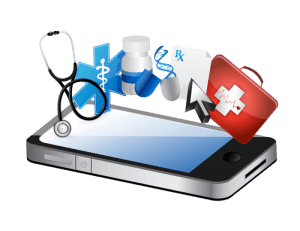
Four Apps That May Improve Patient Care
As health care professionals begin to take notice of ways new communication technologies can be implemented to make it easier to be more effective in their jobs, technology is becoming an increasingly integral part of plans to improve patient care. Mobile technology has specifically become a game changer in the regular practices for doctors and medical facilities, saving both time and money. Mobile apps are an accessible and inexpensive way to engage patients more closely and frequently, allows greater access to electronic health records, provides an easy way for medical professionals to share professional and patient-related information amongst themselves, and gain more knowledge about patients’ medical histories before making contact with them for treatment. However, with over 40,000 healthcare apps in the U.S. iTunes app store alone–and about 75% of these apps being created for consumer and patient use rather than that of a medical professional–many doctors are resistant to using mobile healthcare apps to improve patient care. In the conclusions of a recent study on the integration of mobile apps into standard patient care, the IMS Institute for Healthcare Informatics urges healthcare professionals to begin familiarizing themselves with the healthcare apps that are created for professional use, if only to provide critique on how app developers in the high-tech industry can improve current versions of their products to meet the standards of the medical industry. At General Medicine we encourage all health professionals to stay actively engaged with the ever-changing technology that has the potential to help us all improve patient care. We isolated four mobile apps that we think doctors should try—a reasonable place to start given that almost 11,000 are currently available for professional medical use! We’d like to introduce you to our selection, and hope that you’ll give all four of them a try. 
Doximity
Since 1 out of every 4 doctors use it, you’re probably already familiar with the Doximity, the extremely popular professional social networking site for physicians. The Doximity app for iPhone, iPad and Android brings your professional network into the palm of your hands and lets you take it with you for support wherever you go. You can easily grab contact information and fax numbers, and if you’re a small or private practice Doximity is a great place to get your name out. If you’re looking to test the mobile app waters in a safe way, Doximity is a great place to start because meets the data security requirements of the Health Insurance Portability and Accountability Act (HIPAA). And did we mention it’s free?
Medscape
Medscape is the self-described “#1 mobile platform for U.S. clinicians,” functioning basically as a reference tool for common medications, treatment of over 4,000 diseases, and a current research from a large library of medial research journals. Medscape is available for free on every mobile device: iPhone, Android, iPad and the new Kindle Fire. While in the office you can check dosing, reaction, and side effect information for many drugs without leaving your patient’s side, and answer questions about treatment, patient care and new studies when time is of the essence. Medscape was developed by WebMD and currently has over 4 million users.
Epocrates
Available for iPhone, iPad and Android, Epocrates is ahead of the game as far as trusted new mobile technologies goes. It has both a free version and a paid version. The free version is called Epocrates Rx and includes references for drug interactions, a visual medication identifier, drug information, and an incredibly useful feature not offered by Medscape–a medical calculator. The homepage is customizable so you can quickly and easily access the features you use most frequently. If you love Epocrates, you might consider upgrading to the full version for an annual subscription rate of $159.99. The free “Rx” version is great, but the full “Essentials” Epocrates app is even better and includes a range of other featured including diagnostic tools.
Epic Haiku
Epic Haiku provides hospitals with software that they can use to easily build electronic health records, and provides physicians with the ability to access these records remotely. There are also other useful features such as dictation, clinical image-capturing, e-prescribing, and the ability to review medical charts. Epic Haiku is available for iPod Touch, iPhone and Android, and if you’re stuck with an iPad the Canto app is just as great. What was the first professional healthcare app you used? Do you have a favorite “go-to” app that you use in the office today? Share your thoughts with us!
- How Post-Hospitalists Decrease Health Care Spending - 06-24-2015
- Top Reasons for Hospital Readmissions from SNFs - 06-03-2015
- The Real Cost of Hospital Readmission Rates - 05-20-2015